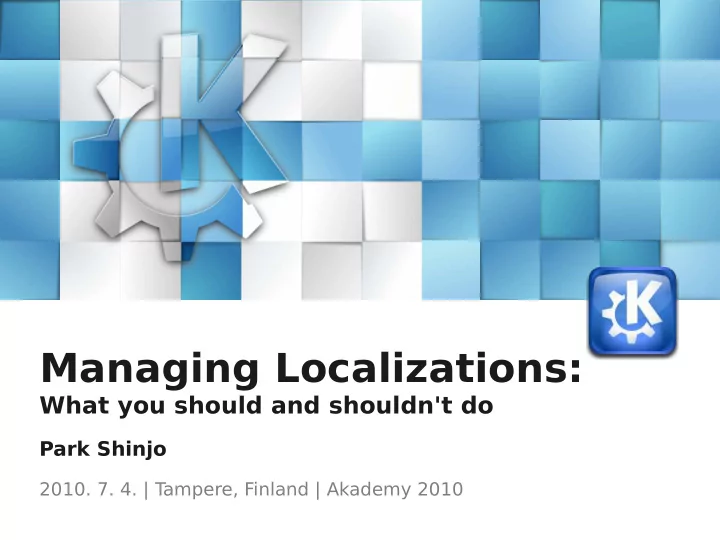

Managing Localizations: What you should and shouldn't do Park Shinjo 2010. 7. 4. | T ampere, Finland | Akademy 2010
Contents ● 5W1H About localization ● Who ● When ● Where ● What ● Why ● How
Who ● Musa is using KDE; he wants to spread KDE to his friends, however it’s all in English ● Gildong is using KDE in his mother tongue; some translations are missing ● Anne translated KDE for several years; now she want some other person to do her work
Translator: be energetic ● Familiar with KDE ● Understand KDE terms ● Aware differences between message and doc ● Fluent language skill ● Passion definitely required
Coordinator: pick a good person ● Passionate about translation ● Not one-time translator ● KDE is evolving even in today ● Collaborate easily with others
Beginning ● KDE usage & background knowledge ● Lokalize, poEdit, vim, notepad, etc. ● kde-i18n-doc@kde.org ● kdelibs4.po, kdebase, desktop_kdelibs.po, desktop_l10n.po ● SVN write access (optional)
One person could... ● … complete almost 40% of KDE translation ● (early 4.x trunk) ● … collect translations by other parties ● Done by each distribution ● Localized Linux distribution ● Floating work done by others
One person could not... ● … complete ‘every’ part of translation ● Documentation is hard work ● String is changing even in today ● … cope with emergencies ● Cathedral vs Bazaar
Common style ● Locally administered style guide ● Do not force one's idea ● Build team internal lexicon ● Use KDE features to think about translations ● “Do not invent style” ● Pick something widely accepted ● Follow common style of the time
Disagreement ● Nobody can “understand” all the languages ● KDE team has no power and knowledge of “judging” what translation is better! ● We should notice about it ● Internal resolving is hard ● T ry to solve problem inside the team ● Redirect to unrelated person when possible
Quality vs. Quantity
Quality vs. Quantity ● Bad localization means bad reputation ● T ranslators should: ● Fix partial translation as soon as possible ● Filter out bad translations when reviewing ● Actually test the translation whenever possible
When ● Notice by the list ● Different release cycles ● KDE SC, Extragear, Playground ● Alpha/Beta → → Message freeze Release ● Deadline: some days before tagging
Stable or trunk? ● 6 months for new major release ● Transition from KDE 3 to 4 was long ● Minor release live only 2~3 months ● Not all release uploaded to distributions ● Lokalize’s 2-way merging ● Stick to trunk: my policy
Where ● Wherever you want, with good connection ● Your home ● Work ● Hack-a-thon ● Somewhere else
What ● Base system ● Program messages ● Region-specific resources ● Documentation
Base system ● Language-specific characters ● Keyboard layouts ● Good-looking fonts ● Standardization
Bloody history of CJK ● Largest block in Unicode ● Don’t fit in 8 bit ● Regional encoding, replaced by UTF-8 ● Customized input method ● Keyboard layout hard/impossible ● Little number of good free font
Now? ● Not every language are used in computer ● Complex scripts, special symbols ● Keyboard layout and/or input method ● Standardization from government ● Base system itself isn’t part of KDE ● Well-structured base system helps KDE
Messages ● Most localization are done here ● Order ● Essential should go first ● Common strings shared by programs ● Frequency of usage
Region-specific resource ● Culture ● Number/calendar system ● Holidays ● Graphics ● Statistics ● Maps
Aware certain area
Documentation ● RTFM ● Not many teams translated yet ● Different from messages ● T ends to update late
Why ● Attract users whose mother tongue isn't English ● Free software easily floats into the Internet ● Assumptions for each language is bad ● Use your mother tongue in your desktop ● Think about yours
How ● Create a team ● Join to the team ● T ranslate the message ● Commit
Found a team ● T ranslate at least 4 base files ● Leave a message at the list ● Sometimes things go not well ● Different person translate same thing ● T ry to contact each other
Join to the team ● Leave message to coordinator/mailing list ● For small team direct connection is preferred ● Mailing list is not always good ● Amount of communication ● Management of mailing list itself ● Not suited for growing teams
Translate the message ● Prepare favorite PO editor ● Checkout branch for your language ● Read all your team's requirements ● T ranslate the message ● T est & Commit ● Send po to your team coordinator ● Directly commit into SVN
Launchpad ● Web-based translation system itself is great ● Policy is not so good ● Licensing ● Quality management ● Back to upstream ● KDE strongly discourage this ● Kubuntu specific string ● Manual copy to upstream
Suggestion: KDE l10n renovation ● T eam info: is it really useful? ● Could be viewed as 'active' ● Can communicate with local language ● Easily outdated, external local team page ● Userbase, T echbase: catchy icons. Why not us? ● Divide section for each group of users ● Static rather than dynamic
Suggestion: KDE l10n renovation ● T ranslation HOWTO/Localization guide ● Mixed targets ● Maintaining two? ● Accessibility to information ● Enough links to other page? ● User survey could help
Thanks ● KDE e.V. for numerous support ● Albert Astals Cid for yielding me the opportunity ● Also managing entire KDE localization ● Those who translated KDE into Korean ● Also including other languages
Image courtesies http://www.motivatedphotos.com/?id=984 ● Screen capture of Marble ●
Recommend
More recommend